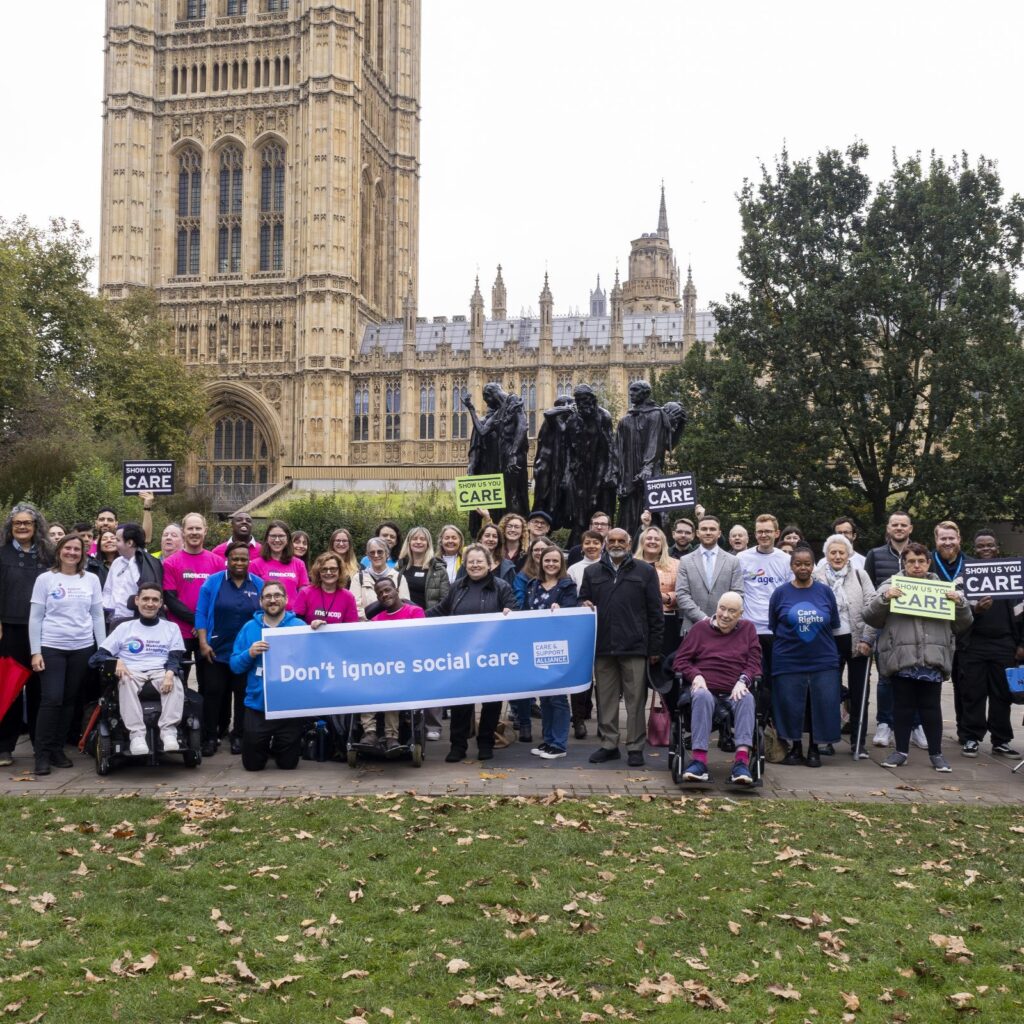'We're the forgotten ones': Labour budget must not ignore 'broken' social care system, families say
Article first published in the Big Issue.
Written by Isabella McRae 25 Oct 2024
Ahead of the autumn budget, a coalition of more than 60 charities wrote to chancellor Rachel Reeves to demand the government invest in social care. Families and care workers share the reality of the system with the Big Issue.
Rasila’s younger sister is 61 and nearing the end of her life. After years lost to dementia and poor health, the grieving process has already started, and Rasila has sacrificed everything to care for her. She fears she will not know herself without her sister.
“As an unpaid carer, I have no life,” she says. “You can’t plan a day. Small things, like getting my hair cut, become impossible. I push myself to the back. There’s no time to relax. Sometimes I’ve forgotten to eat or my tea has become cold. It’s very hard.”
Rasila gave up her job in the city eight years ago, aged 55, to care for her sister, whose health has deteriorated since. Now, her sister receives end-of-life care and requires constant support.
“I had a full time city job. I was a very career minded and city person. I had a challenging career. I was looking forward to continuing. Sadly, the time came when I had to put my family first. So from being a career person, I became a carer,” Rasila explains.
Carers UK estimates that as many as 10.6 million people in the UK provide unpaid care – but they are not receiving adequate financial, emotional and practical support to cope with the challenges.
“We see the human cost daily,” says Jackie O’Sullivan, co-chair of the Care and Support Alliance, a coalition of more than 60 charities. “People are unable to live fulfilling and independent lives. People are worried. Families are under extreme stress.”
Social care remains “chronically underfunded and for far too long has been ignored by successive governments”, according to the Care and Support Alliance. Ahead of the autumn budget, the coalition has written an open letter to chancellor Rachel Reeves to demand the government invest in social care.
Age UK has found that 2.6 million people over the age of 50 in England are going without the care they need, as social care provision has “slipped far below acceptable levels”. This not only impacts individuals and their families but also places strain on public services, particularly the NHS.
“People end up in A&E for want of social care,” O’Sullivan explains. “If they were getting decent support at home, they wouldn’t necessarily end up in A&E. Then you have instances where the NHS can’t discharge them because there is nowhere for them to go, making them feel like a burden.”
Vic Hamilton balances caring for his wife and son, who both have epilepsy and other complex needs, alongside working as a full-time bus driver.
“It’s relentless,” Vic says. “When you do get something go right, you have to focus on that because otherwise you just think of the negatives. If we have a good day, it’s extra good. If we have a bad day, tomorrow’s always better.”
At four in the morning, before he spoke to the Big Issue, his son had a seizure and he had to administer his rescue. “It’s the middle of the night and there’s no one around to talk to,” he says. “ I’m fine during the day, because I’ve got people around me at work, but the nights are really lonely.”
Rasila, based in West London, also finds caring a lonely experience, and she does not have the outlet of work to distract her. She has become isolated from her friends and family because she does not have the time to go out, and she feels she has lost her identity.
“What is my future? I can’t go back to work because I left that career behind and things have changed a lot. Who is going to support me? Is the government going to support me?” she asks.
Rasila receives support from Age UK and meets with other carers to talk about her experiences, but finding the time to do so is difficult.
“I am in society, but yet I am not,” she says. “I cannot mingle with people now. I feel totally isolated and lonely. I worry a lot. If I don’t remain healthy, who will look after my sister? Sometimes I don’t eat. I’m not eating healthily. I’m not looking after myself.”
Vic is also haunted about what might happen to his family if he falls ill. “I worry about that all the time,” he admits. “You try and put it to the back of your mind, but every now and then, something will just trigger these thoughts.”
A stronger social care system could ease the burden on families like Vic’s and Rasila’s. The Health Foundation estimates there is at least an £8.4bn annual funding gap for adult social care, although the previous government asserted that social care was adequately funded.
Under Labour, the Department for Health and Social Care has admitted that the “social care system is broken, and it is unacceptable that so many people are being left without the care they need”. They have promised to build a national care service, underpinned by national standards and locally delivered, to ensure that “everyone can get the care they need”.
The Care and Support Alliance is calling on the government to follow through by addressing the funding shortfall and committing to a long-term financial solution to meet future demand.
“I think the government’s intent is to actually do something long-term and fix it. But we can’t hold out too much longer,” O’Sullivan says.
“We appreciate money is tight, and we’re probably not going to get everything we want, but we do need a long term funding plan. We need a clear signal that we’re moving away from piecemeal. We need some money immediately to go to local authorities. Otherwise, care providers and families are left with the bill.”
Rasila does not receive any benefits and she has to use her savings to survive, and Vic is in a similar position as his income is seen to be too high. A person can earn no more than £151 a week to be eligible for carer’s allowance.
But as Rasila points out, carers are saving the government money by reducing reliance on social care services and the NHS – and that is vital as the UK faces staff shortages as a result of poor pay and working conditions within the social care sector.
Nick Dickinson is a 48-year-old support worker for Mencap who often works 60 hours every week, on just above minimum wage, and he has to use a food bank at times. He can barely afford to support his kids.
“I’m basically on less money now than I was when I was working as a machine operator in a factory when I was 21,” he admits. He works three shifts a week, including over night stays. “I’m knackered. It’s hard to find the balance. I don’t really get family time.”
Mencap and other providers follow national guidelines around pay and hours, including for sleep ins.
Nick feels that the poor pay, which is constrained because of the lack of sufficient funding from the government for social care services, is “demoralising”. He says he feels “ashamed” that he has to go to a food bank and that his children see him struggling with money.
“We’re dealing with people’s lives,” he says. “We’re supporting people’s lives. I don’t feel worthy. You would think in this day and age, support workers and care workers would be valued a lot more.”
Nick worked so many hours during the pandemic that he was hospitalised because he thought he was having a heart attack – his tests came back with the all clear, but his doctor signed him off work for a month, telling him that “nobody” should be working that many hours.
Nick stays in the social care sector because he is committed to helping people, but he has seen many colleagues leaving.
It means the country is becoming increasingly reliant on unpaid carers like Vic and Rasila, who are stepping in to look after the people they love, often without thanks or recognition. Rasila’s sister can no longer talk and does not recognise her. Rasila says she is breathing but she “does not exist”.
“We’re the forgotten ones,” Vic says. “It’s not something you choose. It is something that happens. And until it happens, people do not understand.”





